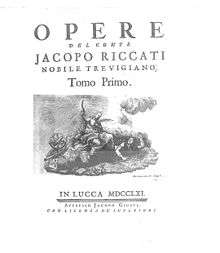Jacopo Riccati
Jacopo Francesco Riccati (28 May 1676 – 15 April 1754) was a Venetian mathematician and jurist from Venice. He is best known for having studied the equation which bears his name.
Jacopo Riccati | |
|---|---|
.jpg) Jacopo Francesco Riccati (1676–1754) | |
| Born | 28 May 1676 Venice, Venetian Republic |
| Died | 15 April 1754 (aged 77) Treviso, Venetian Republic |
| Nationality | Italian |
| Alma mater | University of Padua (LL.D., 1696) |
| Known for | Riccati equation |
| Scientific career | |
| Fields | Mathematician |
| Notable students | Vincenzo Riccati |
| Influences | Stefano degli Angeli |
| Notes | |
Father of Vincenzo Riccati and Giordano Riccati. | |
Education
Riccati was educated first at the Jesuit school for the nobility in Brescia, and in 1693 he entered the University of Padua to study law. He received a doctorate in law (LL.D.) in 1696. Encouraged by Stefano degli Angeli to pursue mathematics, he studied mathematical analysis.
Career

Riccati received various academic offers, but declined them in order to devote his full attention to the study of mathematical analysis on his own. Peter the Great invited him to Russia as president of the St. Petersburg Academy of Sciences. He was also invited to Vienna as an imperial councilor and was offered a professorship at the University of Padua. He declined all these offers.
He was often consulted by the Senate of Venice on the construction of canals and dikes along rivers.
Some of his work on multinomials was included by Maria Gaetana Agnesi, at Riccati's request, in the book on integral calculus of her Analytical Institutions.[1]
The Riccati equation is named after him.
Personal life
His father, Conte Montino Riccati, came from a noble family who owned land near Venice. His mother was from the powerful Colonna family. His father died in 1686, when Riccati was only ten, leaving the youth a handsome estate.
Jacopo's son, Vincenzo Riccati, a Jesuit, followed his father's footsteps and pioneered the development of hyperbolic functions.
A second son, Giordano Riccati was the first to measure the ratio of Young's moduli of metals—preceding the better known Thomas Young by 25 years.
Honors
Jacopo Riccati was named honorary Academician of the Academy of Sciences of the Institute of Bologna in 1723.
Notes and references
- Agnesi, Maria Gaetana (1801). "The author's preface to the reader". Analytical Institutions. Translated by Colson, John. London: Taylor and Wilks. p. XXIII.
External links
- O'Connor, John J.; Robertson, Edmund F., "Jacopo Riccati", MacTutor History of Mathematics archive, University of St Andrews.